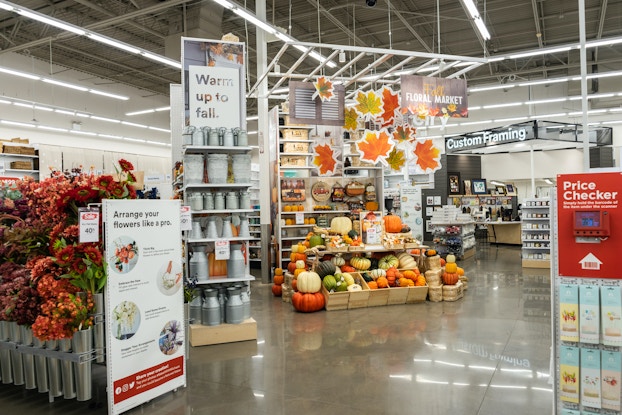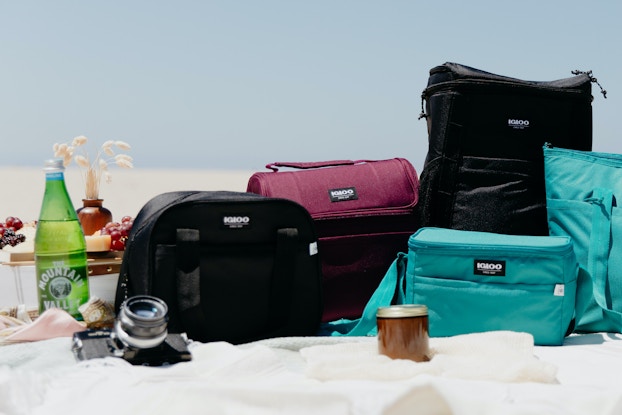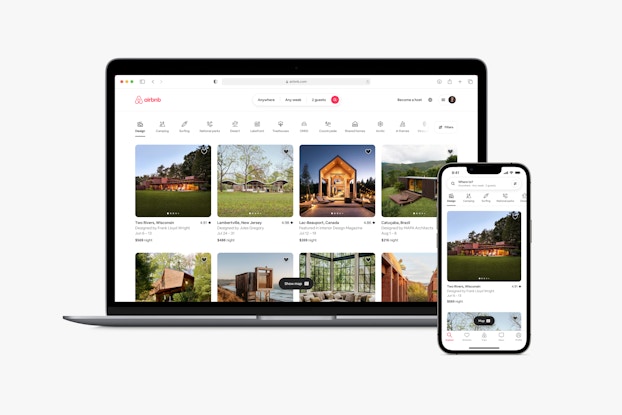
Why it matters:
- Texting provides a natural platform for brands to build their customer databases.
- E-commerce brands can drive sales by sending personalized product recommendations or follow-up texts to customers who have abandoned shopping carts, for example.
- Brands can provide instant, personalized customer service using text messages, including connecting to live associates.
Companies such as Michaels, Airbnb, and Igloo are using SMS (short message service, better known as texting) to enhance their customer databases, help shoppers complete their purchasing journeys, and provide rapid customer service.
“Today, more than ever, brands are doubling down on collecting more data about their customers like first- and zero-party data [data collected directly by your audience and data customers intentionally share with you, respectively] in order to solve the challenges of a privacy-first world and help retain customers,” said Maggie Dunn, Product Marketing Manager at Yotpo, which supports marketing for brands such as Barefaced, Dossier, EM Cosmetics, and Princess Polly.
“By offering incentives such as discounts or early access to new products, brands can more easily attract subscribers and subsequently collect more customer data,” she said.
SMS enables brands to collect data that customers share voluntarily through interactive experiences, Dunn said. Brands can ask their SMS subscribers directly about their product likes and dislikes, for example.
Today’s consumers, especially Gen Z, expect brands to understand their personal preferences, she said. These consumers also tend to be mobile-first.
“SMS marketing enables brands to meet these consumer expectations and deliver real-time experiences, have one-to-one conversations, and win customers back,” said Dunn.
Tapping conversational text messaging to deliver brand expertise to customers
Research from Yotpo found that more than 51% of consumers said they were interested in being able to text with their favorite brands, and 54% said they want to receive coupons, discounts, and promotional offers via text from a brand.
“SMS should be a top priority for brands looking to double down on retention this year,” said Dunn. “Focus on building relationships through your SMS channel, and don’t be afraid to experiment. See what works and what doesn’t with your audience.”
She said brands can “start small” with their SMS strategy to begin to collect subscribers, and then test some revenue-driving tactics such as texting to follow up on abandoned carts.
“Above all, try to personalize as much as possible,” said Dunn. “That starts with greeting your customer by their first name in the text, and use [customer] segmentation to ensure you’re always delivering the most relevant messages.”
For example, Barefaced, a direct-to-consumer skincare brand, uses Yotpo to send personalized text messages to customers about new products and other information, and then adds a layer of interaction by using SMS to facilitate communications with its team of skincare experts, which in turn helps drive product sales.
“The conversational messaging really brings our skincare specialists to life. It makes the brand feel more real and accessible, knowing that you’re talking to a real person on the other side,” said Callie Tivnan, E-Commerce Manager at Barefaced, in a Yotpo case study.
[Read: How to Monetize the Metaverse: Big Brands' Tech Partners Share Tips]
The companies that were early to embrace text now find it is the No. 1 way that they communicate with their customers. They rely on this as their predominant communication channel, and they do everything via text message.Brian Long, Co-Founder and CEO, Attentive
Creating subscriber lists of shoppers who opt in to text messaging to drive sales
Key to SMS-based marketing is compiling subscriber lists of customers who opt in to receive text-based messaging. That has been a particular focus of Attentive, which operates a personalized text-messaging platform and has worked with brands such as Coach, TGI Fridays, and Michaels.
Many brands have been seeing customers opening and interacting with email marketing messages less frequently, said Brian Long, Co-Founder and CEO of Attentive. At the same time, consumers were using their mobile phones more than ever during the pandemic for scanning QR codes, making payments, and other functions. That makes text messaging an ideal platform for brands to reach consumers, he said.
“Everyone who has a phone basically has text messaging, and everyone knows how to use it,” said Long.
Attentive works with Michaels to help the craft retailer grow its text sign-up list, and then send personalized messages to those customers to help drive sales. For example, a customer on the website that adds an item to their shopping cart but doesn’t complete the purchase could receive a reminder about that item later. Long said about 20% of the customers that receive such messages end up following the link back to the shopping cart and buying the item.
“It's a very helpful reminder to the consumer,” he said.
This is an especially important strategy as more consumers browse for products on mobile devices, Long explained. The conversion rate for customers making purchases on mobile devices is about half of the conversion rate on desktop devices, he said, as mobile shoppers may be browsing while on the go, with the intent of possibly making a purchase later. The text message can serve a reminder to these customers to complete the purchase they might otherwise have forgotten about.
[Read: Marketers from Kellogg to Walmart Optimize QR Codes to Drive Consumer Engagement and Sales]

Replicating the intimacy of in-store service: Texting is ‘a much more personal, one-to-one, interactive channel’
Delivering relevant messages to customers is critical to the success of SMS communications, Long said.
“It’s a much more personal, one-to-one, interactive channel,” he said.
Text messaging that connects customers with product experts is akin to providing the service that customers are used to receiving from sales associates in brick-and-mortar stores, Long explained.
“The companies that were early to embrace text now find it is the No. 1 way that they communicate with their customers,” he said. “They rely on this as their predominant communication channel, and they do everything via text message.”
He drew a parallel with the use of the WeChat platform in China, a text-based messaging service that is widely used by businesses and their customers for communication in that country.
“I think you could see a very similar thing happen here in the United States between people and businesses using text messages,” Long said.
He expects to see an increase in consumers making purchases via text messages, along with receiving text message follow-ups about the status of their order, and the ability to ask questions about their order via text.
“It's just a much more logical way to do things,” said Long. “Customers could decide they want to buy a pizza again, send a text, and just buy it, without having to enter their credit card or anything again.”

Live texting at Igloo boosts sales conversion rates
Attentive worked with cooler maker Igloo on a program that used Attentive’s live-chat customer service platform, Attentive Concierge, to help shoppers make product selections. Igloo was seeking to find more effective ways to provide a curated shopping experience while boosting its direct-to-consumer e-commerce sales.
“We could answer all their questions via Concierge, and then that turned into more sales,” said Long. “It shows how text is becoming more interactive.”
Concierge agents helped drive a 333% lift in conversions, as customers appreciated the proactive outreach from an actual person, he said.
Kizzy Ezirio, Digital User Experience Director at Igloo, said she has been pleased with the agents’ responses.
“They’re helping us bring the in-store experience to our customers’ phones, which is great to see and a really huge benefit for our SMS subscribers,” she said in a case study provided by Attentive.
The success of text messaging boils down to providing time savings, convenience, and a positive experience for customers, said Long.
“If you do those things, it's going to be great for businesses,” he said. “Businesses are going to make a lot more money, because they're delighting the consumer.”
Airbnb taps SMS to speed up customer response times
Text messaging can streamline communications between businesses and their customers, offering a quick and easy tool for relaying information back and forth. At Airbnb, for example, the company used technology from Twillo that sends a text-based reminder to hosts that potential renters have inquired about their properties.
Hosts receive an automated SMS message from Airbnb with information about the potential renters, the dates of their planned stay, and the price, and the hosts can then quickly respond with a text.
Allergan, the manufacturer of BOTOX Cosmetic and other beauty products, incorporated SMS messaging into the company’s recent shift toward a direct-to-consumer model. Historically, the company operated what it described as a B2B2C business model, selling products to healthcare providers, who then resold them to consumers.
It also wanted to shift from a reliance on an email-centric customer database to one based on phone numbers, the company said.
“It’s a lot easier to share your phone number with your doctor or practice,” Christine Li, Director of Marketing Technology at Allergan said on Twillo’s website. “We wanted to focus on having phone numbers as a way to identify our consumers. SMS is also a more intimate way to communicate with our consumers.”
Allergan implemented Twillo Segment to collect, unify, and connect its customer data and enable accurate user profiles, as well as Twilio Programmable Messaging to send transactional text messages to its loyalty program members.
The new customer engagement architecture helped Allergan tailor relevant messages to send directly to individual customers and enabled the company to relaunch its personalized customer loyalty program, called Allē. As a result, the company’s efforts drove more than $400 million in DTC sales in 2021, according to Twillo.
CO— aims to bring you inspiration from leading respected experts. However, before making any business decision, you should consult a professional who can advise you based on your individual situation.
Follow us on Instagram for more expert tips & business owners’ stories.
CO—is committed to helping you start, run and grow your small business. Learn more about the benefits of small business membership in the U.S. Chamber of Commerce, here.

What can membership do for your business?
Gain tools to stay informed, competitive, and connected by becoming a U.S. Chamber of Commerce member. Membership gives you direct access to expert policy insights, economic updates, and exclusive resources designed to help your business thrive. From behind-the-scenes analysis from D.C. to exclusive discounts and expert support, U.S. Chamber membership helps you navigate change and seize new opportunities.







